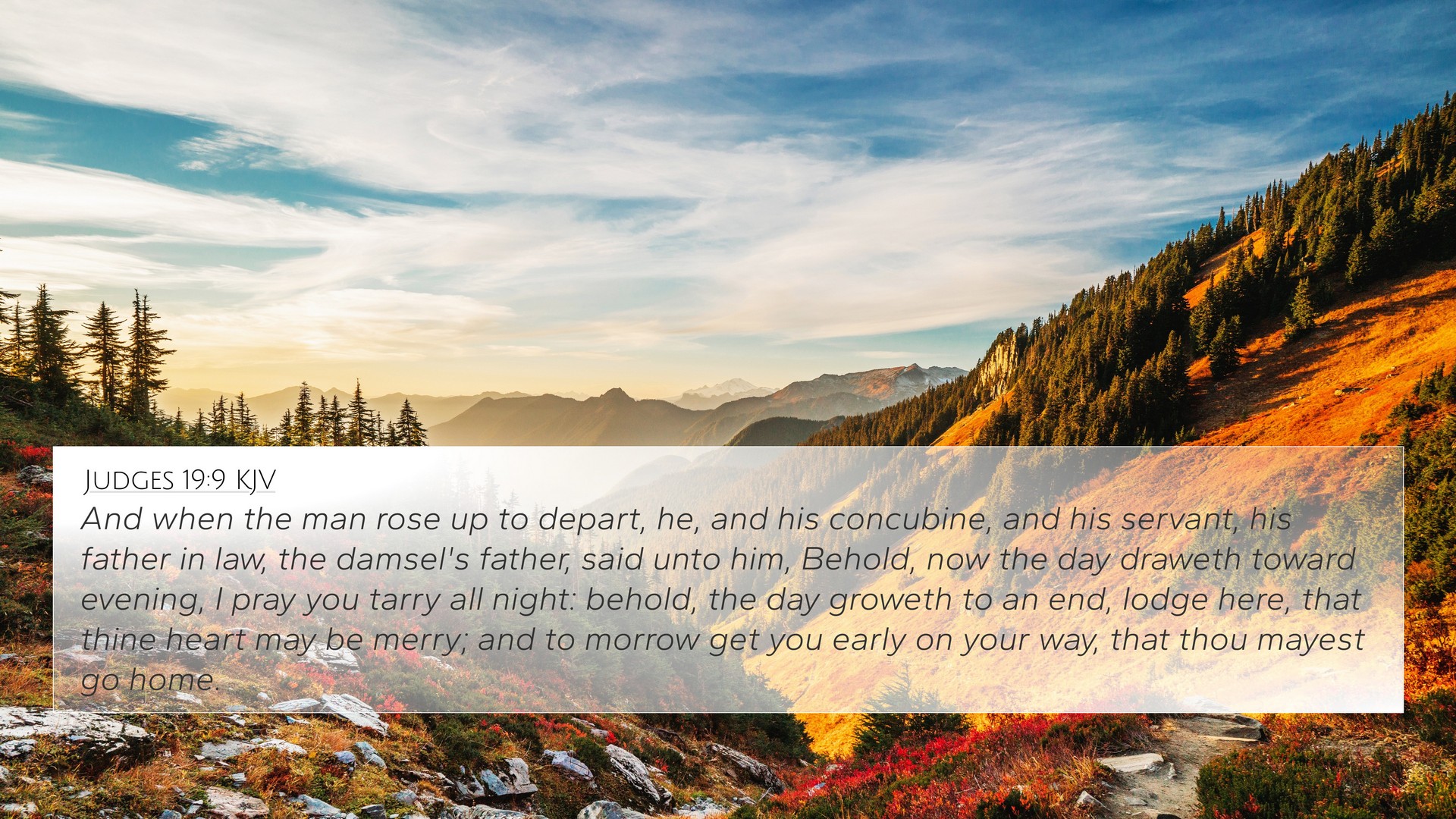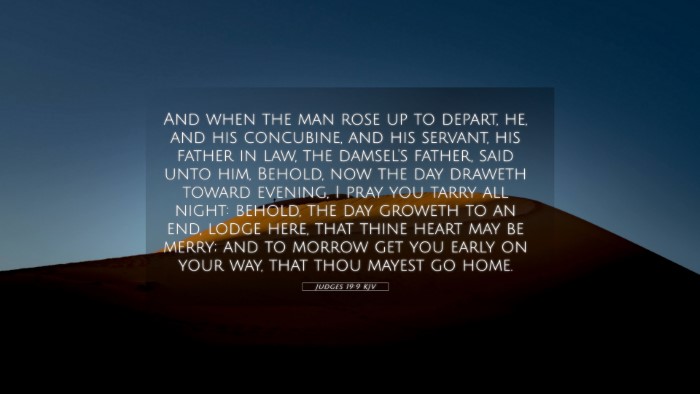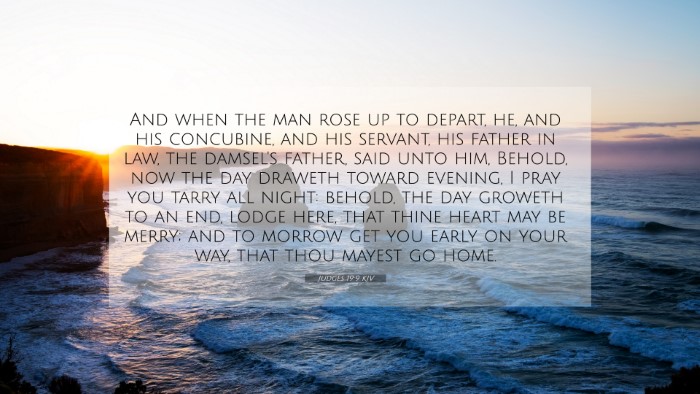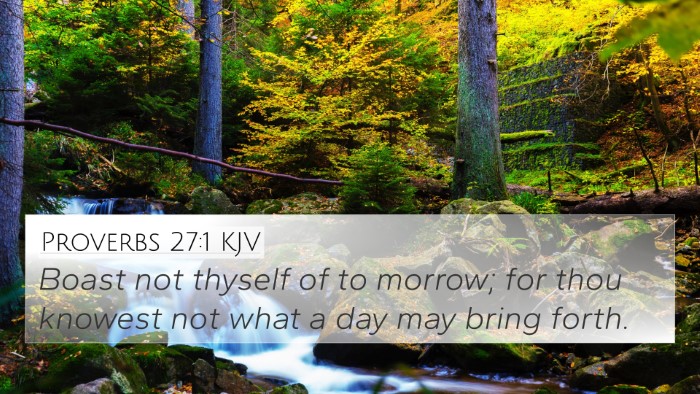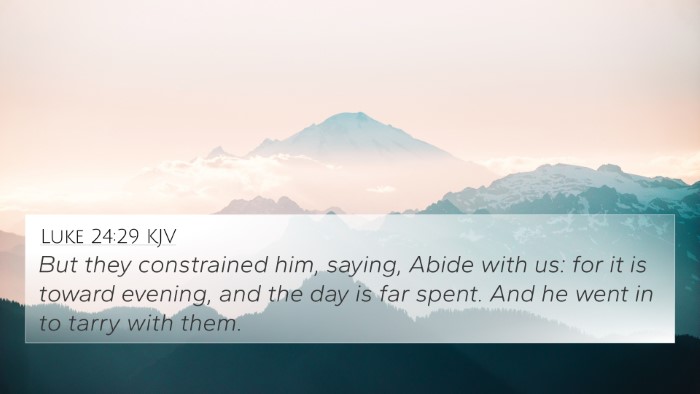Bible Verse Meaning and Interpretation: Judges 19:9
Verse Context: Judges 19:9 states, "And when the man arose to depart, he, and his concubine, and his servant, his father-in-law the damsel's father said unto him, Behold, now the day draweth toward evening, I pray you tarry all night: behold, the day groweth to an end; lodge here, that thine heart may be merry; and tomorrow get you early on your way, that thou mayest go home." This verse takes place in a narrative that explores themes of hospitality, social relations, and moral decay within Israel before the establishment of monarchy.
Summary of Key Insights from Public Domain Commentaries
- Matthew Henry: Henry emphasizes the importance of hospitality in ancient culture and critiques the harshness that arose in Israel. This passage exemplifies the tension between individual desires and societal norms.
- Albert Barnes: Barnes notes that this verse underscores the care shown by the father-in-law. The invitation to stay reveals the communal aspect of ancient living and expresses a longing for connection amidst a context of loneliness.
- Adam Clarke: Clarke points out that the mention of the 'concubine' serves not only to illustrate family dynamics but also to highlight the instability and vulnerability of women in a patriarchal society.
Analysis of Judges 19:9
This verse symbolizes the tension between the urgency to leave and the desire for fellowship. The father-in-law’s insistence reflects cultural values that prioritize communal living over individualism, which mirrors the broader themes found in the book of Judges where moral and social disarray emerges.
Cross-References to Enhance Understanding
- Genesis 19:1-3: The hospitality shown by Lot mirrors the invitation in Judges, showing a positive aspect of communal living.
- Proverbs 27:10: “Thine own friend, and thy father's friend, forsake not.” This notion of companionship resonates deeply within the context of Judges 19:9.
- Hebrews 13:2: “Be not forgetful to entertain strangers: for thereby some have entertained angels unawares.” This illustrates the significance of hospitality in the life of believers.
- Ruth 1:16: Ruth's determination to stay close to Naomi reflects similar themes of loyalty and willingness to remain in fellowship.
- Hebrews 10:24-25: Encouragement of one another adds depth to understanding community and relationships mentioned in Judges.
- Matthew 10:40: This encompasses the dynamic of receiving others as a reflection of receiving Christ.
- Luke 10:7: Jesus speaks on relying on the hospitality of others, revealing a common thread in scriptural teachings about neighborly love.
Thematic Connections
This passage allows for thematic exploration connecting the concepts of hospitality, community, and the relational dynamics that define human interactions across the scriptures. Themes are not isolated but interconnected, prompting exploration into cross-referencing Biblical texts for a richer understanding:
- Community and Hospitality: Judges emphasizes the necessity of interpersonal relationships and social support, paralleled in the New Testament teachings.
- Moral Decay: The backdrop of Judges reveals a period of chaos, prompting reflections on divine order found in later texts such as the Gospels.
- Vulnerability of Women: The treatment of women throughout the scriptures, particularly in Judges, invites analysis of how these themes resonate with later theological understandings.
Practical Tools for Cross-Referencing
To delve deeper into the connections between Bible verses and enhance your understanding of Judges 19:9, consider utilizing:
- Bible Concordance: A comprehensive tool for locating specific verses and exploring related scriptures.
- Bible Cross-Reference Guide: Essential for finding thematic links within the text.
- Cross-Reference Bible Study Methods: Different methodologies can aid in connecting disparate themes and motifs across the scripture.
- Bible Reference Resources: Extensive materials that offer insights and deeper understanding.
- Identifying Connections: Focusing on Old Testament and New Testament interactions enriches the interpretations of individual verses.
Conclusion
Judges 19:9 presents a rich tapestry of relational dynamics, wrapped in the larger theme of community within the biblical narrative. Through cross-referencing with related verses and applying insights from various commentaries, readers can grasp the profound lessons embedded within the scriptures. Exploring these connections opens the door to a deeper understanding of God's narrative through the lens of human experience.
